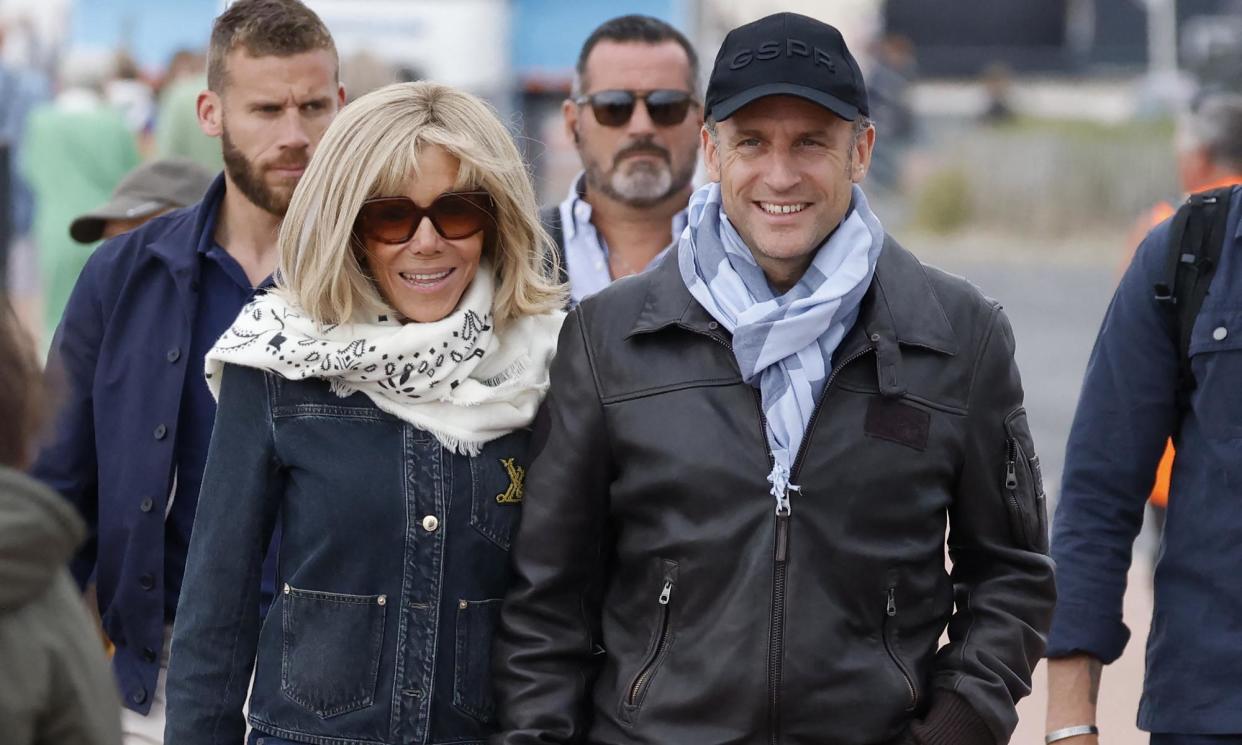Macron sought clarity – and has brought his centrist project tumbling down

When Emmanuel Macron strolled through the seaside resort of Le Touquet on Sunday afternoon, near his holiday home, dressed in a leather jacket with his collar up and aviator shades, smiling and asking passersby how they were doing, he seemed a world away from the fact that his gamble of a snap election was about to dramatically backfire.
Macron had said he needed “clarity” three weeks ago, when he shocked even his own government ministers by calling a high-risk sudden parliament election after his centrists were trounced by the far-right National Rally (RN) in the European parliament vote.
By Monday lunchtime, when the French president gathered his advisers and ministers at the Elysée for crisis talks, he did have some form of clarity, but not the type he had been hoping for. It was clear that, after seven years in power, Macron had brought his centrist project tumbling down.
Related: French left and centrists scramble to unite against far right for election runoff
Macron had sought to wrongfoot the RN and the left with a lightning-speed, three-week election in which he believed he could frighten voters into backing his centrists by warning that a win by the far right or the left alliance would spark “civil war”.
Instead, Marine Le Pen’s far-right, anti-immigration RN, which for decades was regarded as a danger to democracy that promoted racist, antisemitic and anti-Muslim views and had to be kept out of mainstream politics at all costs, confirmed its steady rise in parliament.
The RN took about one-third of the national vote, meaning that whether or not it gains an absolute majority to form a government, it is now on track to become the dominant force and biggest party in the French parliament. Its nationwide vote share – combined with its allies from Éric Ciotti’s Les Républicains – exceeded even the resounding score of Macron’s centrists in the parliament elections of 2017. The RN’s strong showing went far beyond its traditional heartlands in the north-east and on the Mediterranean coast, spreading across the country, notably in the south-west, the west and centre.
The left alliance, in second place, is fighting to increase its seats but appears unable to reach an absolute majority in parliament. The centrists, lagging behind in third, are likely to lose more than 100 seats.
The backdrop to this political earthquake is a country that is increasingly divided. Demonstrators on the left have taken to the streets in big cities to protest against the far right and warn of the dangers of racism and discrimination. Meanwhile, in the countryside, villages and cutoff hinterlands outside middle-sized towns, RN voters said they chose the far right because they couldn’t make ends meet, pay their petrol bills or get a doctor’s appointment in rural areas. They celebrated Le Pen’s progress and said they felt hope and wanted change.
The big challenge now, in other words, lies not just in how to form a government, but how to ensure a cohesive society.
The next 24 hours of bargaining over tactical voting in the second round will define the final outcome next Sunday. Historically, parties on the left or centre-right have done deals to stand back in order to avoid splitting the vote against the far right. But this is less than certain now. The left, whose supporters voted for Macron to keep back Le Pen in two presidential elections, expressed anger that many centrists now placed its left alliance on a par with the far right and would not clearly back them.
France is facing several possible scenarios. The first, which most pollsters suggested was likely, would see the RN win a majority of seats, becoming the biggest party in parliament, but falling short of the absolute majority of 289 needed to form a government. It would be the dominant force, with Macron as president, but there could be deadlock.
Another scenario, which is seen as difficult for the RN to pull off but not impossible, is that it wins an absolute majority and forms a government with the young party president, Jordan Bardella, as prime minister. It would be the first time in French history that a far-right party wins a parliamentary election and forms a government. Macron would have to share power.
A third scenario would be somewhere in the middle, with the RN falling short of an absolute majority but finding a way to govern anyway by striking deals or bringing over lawmakers from the right.
The impact of the RN’s anti-immigration project on France would be significant. It seeks to scrap nationality rights for children born and raised in France by foreign parents, and bar dual nationals from strategic jobs. If it forms a government, it would have the final say on budgets for military support for Ukraine.
But its ultimate aim is to lay the ground for Le Pen to win the presidency in 2027 in order to implement its full programme to limit immigration, give French citizens priority over non-nationals for jobs, social welfare assistance and housing and clamp down on what it called “Islamist ideologies” including the wearing of the headscarf.
Macronism – a centrist force built around one man, who in 2017 promised to revolutionise politics with pragmatist cherrypicking from left and right, only to veer right after his reelection in 2022 – is now waning.
The pro-European centrist block in France still exists, but it will be far smaller and weaker from now on. It will seek to reorganise itself after this earthquake, but quite how it will do so is uncertain.

 Yahoo News
Yahoo News 
